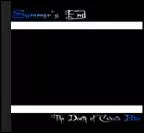The term "uneven" is thrown around frequently in a derogatory sense, but I have never been one to automatically deem unevenness an undesirable or terrible trait. Some art thrives on breaking the boundaries, shifting gears at unexpected times, and using such shock effectively. Sometimes it works. That said, Summer's End's debut album The Death of Celeste Blue is perhaps the most uneven matching of musical styles I have heard in a long time. However, this unevenness is not remotely interesting or well constructed, and frequently, it is more comical than revolutionary.
Self-described as melodic hardcore, I am weary of allowing that classification. This isn't melodic hardcore. No way. Certainly, some sloppy hardcore-esque screaming is present a few times on the album, mostly on the opening track, "An Occasion for Dying" and another, "Forgotten." But melodic hardcore? This is pop punk. Really poppy pop punk. The screams that pepper this generic music are forced and inorganic. The whole experience feels like a bastardization of two extremes of the spectrum–no meeting in the middle.
Melodic hardcore frontrunners, Death by Stereo, Strike Anywhere, Rise Against, and the like, utilize the energy and structure of hardcore music and fuse that with harmony and melody. With Summer's End, we have a poppy band sounding like say, a crappier Dynamite Boy who had a baby with Allister, then urinated on it and force fed it some interjecting throaty hardcore screams at sporadic moments. The music on The Death of Celeste Blue is messy, with simplistic guitar work and some out of pitch, flat vocals, but this forced and odd hybrid of brutal screams in this pop style magnifies the album's overall sloppiness. It's just not done well. It's more than uneven; it's just not effective in any way.
Unfortunately, The Death of Celeste Blue is not saved by it's lyrical content, which is filled with the all too common teenage anguish with limited emotional depth. On track, "Katydid," when singer Benny Snyder wails, "Always waiting, hesitating, such a while, I miss your smile," it evokes cringes. But if you can make it through that, soon, Snyder's voice echoes four times on "in your wildest dreams, dreams, dreams, dreams," at which point the entire scenario becomes laughable. Yawn. It's beyond generic. There's also only seven songs, and each runs a little too long for it's own good. The album is limited and the only resemblances of diversity are the deficient hardcore elements.
The thematic content here is rehash. Same old, same old slop about relationships, no real insight, no real emotion. The music is sloppy (the best word to describe it), and the laughable attempt at a hardcore fusion with this cliché pop punk sound simply does not work. This definitely isn't good hardcore, and it's not good pop. It brings back haunting similarities of what one might hear at a mediocre high school garage band's practice. But maybe Summer's End is not without hope. The theory of their musical fusion was an idea, though not one that works in the end. At least they tried something. The band is still quite young, and hopefully the future holds some maturation of sound and songwriting. Because by diverging their style and effort, Summer's End has given us nothing organic or listenable on this markedly poor debut release.
